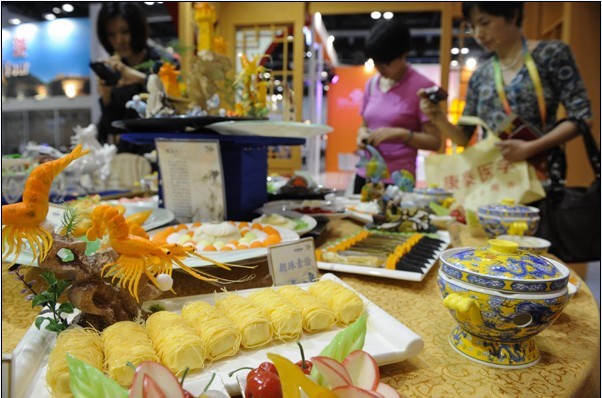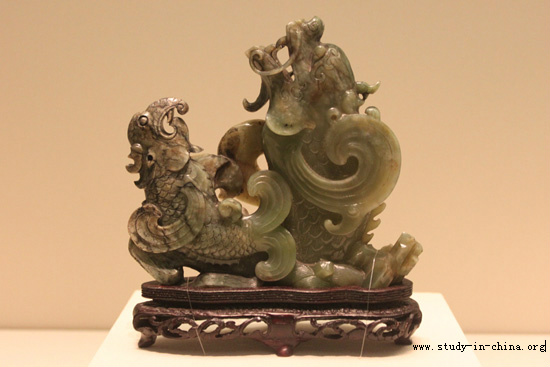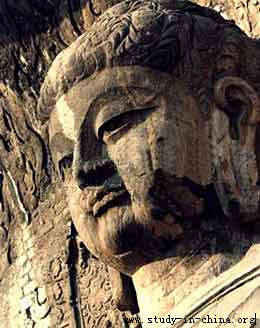| Home > China Feature |
the Ancient Chinese Marriage Rituals
P: Hello. Welcome to ‘Ask Pingping and Jules’, your bridge to Chinese culture. I’m Pingping.
J: Da4jia1 hao3. Hello everybody. I’m Jules, 朱丽安. Last time we talked about "Chinese marriages".
P: Right. We talked about modern marriages in China. So Jules, how much do you know about the ancient Chinese marriage rituals?
J: Wow, let me think. Ah, not too much I’m sorry to say.
P: That’s ok. I’ll tell you. Traditional marriage rituals are generally known as the ‘three letters and six etiquettes’ (三书六礼).
J: What’s the "three letters" mean?
P: The three letters were the betrothal letter, the gift letter and the wedding letter.
J: Sounds interesting. Could you tell me more about it?
P: Yeah, The betrothal letter was sent from the groom’s family to the bride’s family, and formally requests a marriage. The gift letter listing the gifts to be given would accompany the groom’s family’s gifts to the bride’s family shortly before the wedding. The wedding letter was given on the day of the wedding, officially accepting the bride into the groom’s family.
J: And what do the "six etiquettes" mean?
P: The six etiquettes then led to the final wedding ceremony.
J: How did that work?
P: First of all was Proposing. When an unmarried boy’s parents found a potential daughter-in-law, they would invite a matchmaker to make the proposal with them at the girl’s home.
J: Was it always success?
P: Almost always. Because they searched for a girl who was a suitable match -- that means a girl whose family had the same social status and level of wealth as them before they invited the matchmaker, or they could inquire about some information through the matchmaker.
J: I see. So in this way the matchmaker played a really important role, right?
P: Yes, and If the proposal was successful the matchmaker (usually a woman) would be rewarded with gifts and a feast to show the two families’ gratitude. Then the unmarried young people were not allowed to see each other until their wedding day.
J: That’s strange. And I heard that Chinese parents liked to ask a fortune teller to predict whether they were a suitable match, or not.
P: Yes, the fortune teller would compare the girl’s full name and birthday with the boy’s and see whether there would be a happy marriage.
J: It was quite a detailed process. What came next?
P: Then came Presenting Betrothal Gifts: if the match was predicted to be auspicious, the matchmaker would take gifts to the girl’s parents and tell them that the process could continue. And next was Presenting Wedding Gifts: Prolific gifts were presented again to the girl’s family, symbolizing respect and kindness towards the girl’s family as well as showing that the boy could provide a good life for the girl.
J: That sounds great. And I heard that all the gifts should be double, that showed the groom’s family’s wealth and also meant good luck would be with the newlyweds, just as the Chinese idiom "好事成双(hǎoshì chéng shuāng)" says. Oh I know what’s the next, the ceremony, right?
P: Before that they must "Select the Wedding Date" before the ceremony. The boy’s family asked the fortune-teller to choose a date according to the astrological book so it could be the most suitable and auspicious to hold the wedding ceremony. And the last thing was the ceremony itself.
J: Oh, the most exciting and nerve-racking time. I know there are three steps: before the wedding reception, during and after. The bride wore a red dress in ancient times but nowadays they are just as likely to wear a white dress as well.
P: Yes, it began with the groom in a long, red gown riding a horse, accompanied by his wedding party, travelling to meet his bride at her home. Once the groom arrived he would meet a series of difficulties intentionally set by the bride’s friends and family. Only after coping with these could he pass to see his wife-to-be. Then the bride, covered by a red scarf over her head, would be led to a sedan chair.
J: I recently saw a costume drama on TV, the bride cried before she went to the sedan chair, why? Is the wedding day not a happy thing?
P: Yes, of course it is but the bride must cry with her mother to show her reluctance to leave home. This shows her duty to her parents.
J: Oh, and what difficulties must the bridegroom overcome if he wants see his bride?
P: Good question, He had to kick the sedan door three times and shoot an arrow to a point of the sedan door, among other things.
J: Oh, what would happen when they arrived at the place of the wedding?
P: There would be music and firecrackers and a festive, joyous atmosphere. Then during the wedding the bridegroom and bride would kowtow three times to heaven and earth, parents and spouse. They would answer some vows like “Are you willing to be this man’s wife/woman’s husband, for better or worse?” After that moment they became a couple. Then the new couple would go to their bridal chamber and guests would be treated to a feast.
J: And after the wedding were there any activities?
P: Yes, on the night of the wedding day, there was a custom in some places for relatives or friends to playfully annoy and tease the newlyweds. It’s called "闹4洞4房2". Though this seemed a little noisy, both of them forgot their shyness and became familiar with each other.
J: That must have been very funny and a little awkward.
P: Of course. And on the third day of the marriage, the new couple would go back to the bride’s parents’ home. They would be received with a dinner party which included relatives.
J: Today we talked about some ancient Chinese wedding customs. If you have any comments, or suggestions for topics for this program please contact us at CRIenglish.com or write as an email to …..
P: Askpingpingandjules@cri.com.cn.
J: Until next time, Zai jian.
P: Zai Jian. Bye-bye!
Art
 more
moreChina Beijing International Diet ...
Recently, The hit CCTV documentary, A Bite of China, shown at 10:40 ...

Exhibition of Ancient Chinese Jad...
At least 8,000 years ago, Chinese ancestors discovered a beautiful...

Longmen Grottoes
The Longmen Grottoes, located near Luoyang, Henan Province, are a tr...

Custom
 more
moreWeb Dictionary
Martial Arts
Tai Chi Master Class Held in Moscow
MOSCOW, June 15, 2016 (Xinhua) -- Students learn from Shaolin ...
Celebriting 70 years' efforts in restoring Mogao...
Work is being carried out at the restoration site of cave No 98 a...
Hong Kong Children's Symphony performs in Seattle
Under the theme of Tribute to the Golden Age, a concert featuring a ...





 print
print  email
email  Favorite
Favorite  Transtlate
Transtlate 








